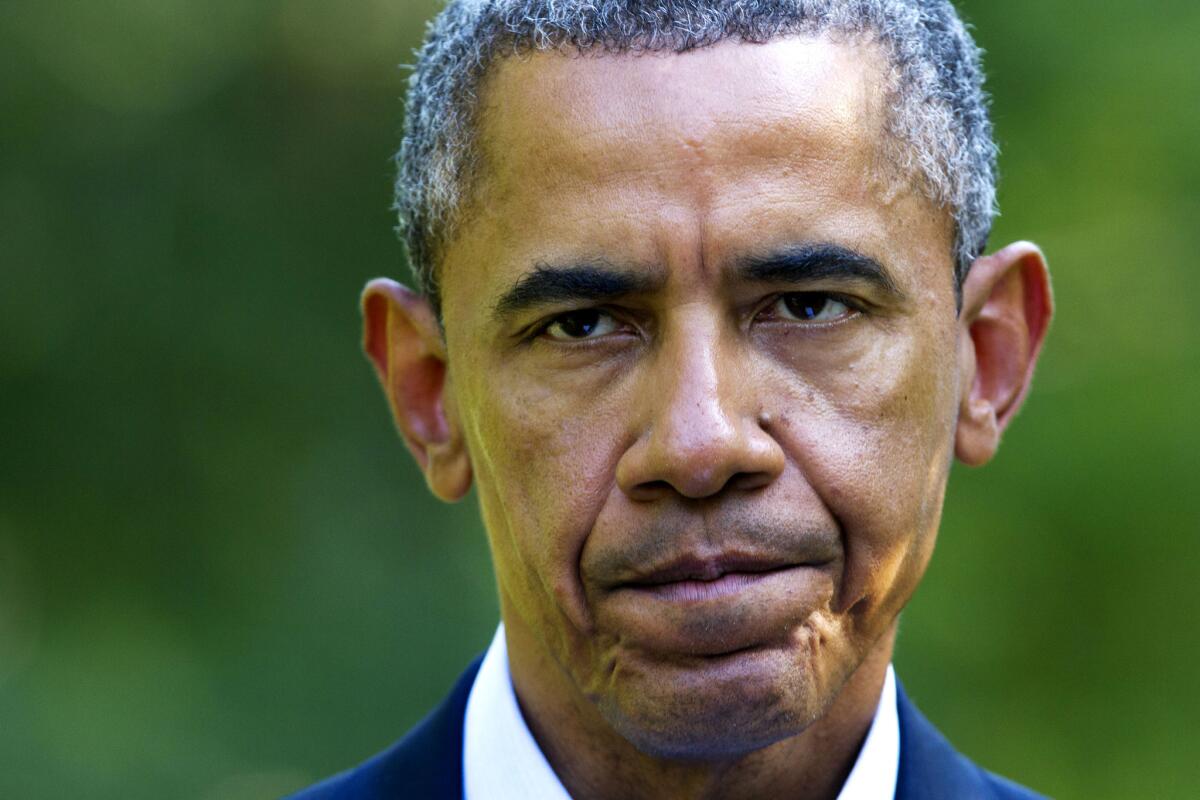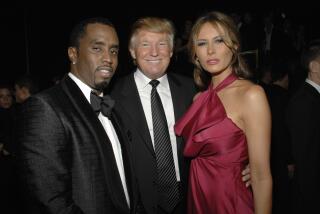In Michael Brown case, race rears once again for President Obama

- Share via
Once more onto the high wire of race for President Obama, once more because a young black man had been shot dead on an American street.
On Tuesday, Obama offered a deliberately worded plea for peace in Ferguson, Mo., where nights of unrest have followed the death of Michael Brown, an 18-year-old whose life ended in a confrontation with police.
The president termed Brown’s death “heartbreaking” and called on others, as has Brown’s family, to honor his life with nonviolence.
“I know the events of the past few days have prompted strong passions, but as details unfold, I urge everyone in Ferguson, Missouri, and across the country, to remember this young man through reflection and understanding,” Obama said in a statement issued by the White House.
“We should comfort each other and talk with one another in a way that heals, not in a way that wounds. Along with our prayers, that’s what Michael and his family, and our broader American community, deserve.”
It was thus after the 2012 killing in Florida of Trayvon Martin by George Zimmerman, who later was acquitted in Martin’s death. It was thus after an earlier altercation between a black university professor and a white cop in Cambridge, Mass., that resulted in the professor’s arrest.
By virtue of his role as president, Obama represents all Americans, including Zimmerman and the unidentified cop in Missouri who fired the most recent fatal shot. By virtue of his birth, he is keenly aware of the punishments often visited on African American boys and men. Even with his public standing weakened by six tumultuous years in office, he remains the American best positioned to explain each side to the other, to try to seed understanding among those still listening.
The measured nature of Obama’s Tuesday remarks may be in part situational—the Justice Department is investigating the death, and he can’t presuppose the results of their inquiry; the facts of the shooting are in dispute; and any more emotional response might threaten to further inflame the passions he sought to tamp down.
It was not hard to imagine that his private view hews closer to his more emotional reactions after 17-year-old Martin was shot dead in a Florida suburb while walking back from a trip to buy Skittles.
In the spring of 2012, shortly after Martin’s death, Obama wrapped him in a familial embrace.
“If I had a son, he would look like Trayvon,” he said, personalizing the death in a way no president before him could have.
And later, after the verdict cleared Zimmerman, Obama elaborated on the distance between white America and black America, particularly when it comes to the experiences of black men. He offered bracing reminders of the small yet significant slights commonly suffered, and how they burn.
“There are very few African American men in this country who haven’t had the experience of being followed when they were shopping in a department store. That includes me,” the president said. “And there are very few African American men who haven’t had the experience of walking across the street and hearing the locks click on the doors of cars. That happened to me, at least before I was a senator.
“There are very few African Americans who haven’t had the experience of getting on an elevator and a woman clutching her purse nervously and holding her breath until she had a chance to get off. That happens often.”
And, he added, “that all contributes, I think, to a sense that if a white male teen was involved in the same kind of scenario, that, from top to bottom, both the outcome and the aftermath might have been different.”
It wasn’t different Saturday in Ferguson, nor was the aftermath of Michael Brown’s death: the tear-stained anguish of the parents, the national debate, the institutional apparatus of conflict. (The lawyer who represented Trayvon Martin’s family is now representing Michael Brown’s.)
Not much distance had been trod in the two years between the deaths of the two young men, and the country seemed not that much further along in what Obama described in his elaboration last year as “this long, difficult journey.”
“You know, we’re becoming a more perfect union -- not a perfect union, but a more perfect union,” he said.
For political news and analysis, follow me on Twitter: @cathleendecker
More to Read
Sign up for Essential California
The most important California stories and recommendations in your inbox every morning.
You may occasionally receive promotional content from the Los Angeles Times.











